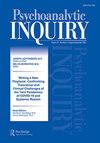太空漫游:改变分析环境的物理方面对分析者、病人及其关系的影响
IF 0.5
4区 心理学
Q3 PSYCHOLOGY, PSYCHOANALYSIS
引用次数: 0
摘要
作为一名高级分析师,我对咨询室空间的重新建模成为了一个变革的过程。通过临床实例,贯穿嫉妒、对新事物的愉悦、对熟悉事物的丧失和对我主体性的特权等主题,改变的身体环境对我的病人、我自己和我们的关系的影响被检验了。将我的职业之家概念化为巢,物质空间,持有环境和自我客体体验,并在关系和发展背景下考虑唤起物理对象的例子。在疫情期间,这个滋养空间成为了一个避难所。关键词:精神分析、办公室、家居、空间转换、唤起性客体持有环境披露声明作者未发现潜在的利益冲突。作者简介:sandra G. Hershberg,医学博士,精神分析学家,成人和儿童精神病学家。她是华盛顿特区当代心理治疗和精神分析研究所的精神分析培训主任、创始成员、培训和监督分析师。她是华盛顿巴尔的摩精神分析中心的培训和监督分析师,并于2019年获得了卓越教学奖。Hershberg博士是圣路易斯精神分析研究所和匹兹堡精神分析中心的地理监督分析师。她是乔治城大学医学院的临床副教授,也是美国精神分析协会项目委员会的成员。赫什伯格博士是《精神分析、自我与情境》杂志的副主编,也是《精神分析探究》杂志的编辑委员会成员。赫什伯格发表并发表了各种主题的论文,包括传记和精神分析、怀孕和创造力、治疗行为、伦理和母女关系。她最近的论文包括《用明显的面部差异养育一个孩子:母亲的凝视和他者的凝视》和《艺术和精神分析中女性对女性身体的凝视:宝拉·莫德索恩-贝克尔》。赫什伯格博士是《精神分析理论、研究和临床实践:阅读约瑟夫·d·利希滕贝格》一书的共同编辑和撰稿人,该书于2016年由劳特利奇出版社出版。2021年,她与人合编了一期《精神分析探究》,题为《撰写新剧本:面对COVID-19和系统性种族主义双重流行病的理论和临床挑战》。本文章由计算机程序翻译,如有差异,请以英文原文为准。
A Space Odyssey: The Impact of Changing the Physical Aspects of the Analytic Setting on the Analyst, the Patient and Their Relationship
ABSTRACTThe re-modeling of my consulting room space, as a senior analyst became a transformative process. Through clinical examples that traverse themes of envy, pleasure in the new, loss of the familiar and privileging my subjectivity, the influence of the altered physical setting on my patients, myself, and our relationship is examined. Conceptualizations of my professional home as nest, matricial space, holding environment and selfobject experience are considered along with examples of evocative physical objects in relational and developmental contexts. This nourishing space became a sanctuary while working virtually during the pandemic.KEYWORDS: Psychoanalytic officehomematricial spacetransformationevocative objectholding environment Disclosure statementNo potential conflict of interest was reported by the author.Additional informationNotes on contributorsSandra G. HershbergSandra G. Hershberg, M.D., is a psychoanalyst and adult and child psychiatrist. She is the Director of Psychoanalytic Training, Founding Member and Training and Supervising Analyst at the Institute of Contemporary Psychotherapy and Psychoanalysis in Washington, DC. She is a Training and Supervising Analyst at the Washington Baltimore Center for Psychoanalysis, where she received an award for excellence in teaching in 2019. Dr. Hershberg is a Geographical Supervising Analyst at the St. Louis Institute of Psychoanalysis and the Pittsburgh Psychoanalytic Center. She is a Clinical Associate Professor at Georgetown University Medical School and serves on the Program Committee of the American Psychoanalytic Association. Dr. Hershberg is an Associate Editor of the journal Psychoanalysis, Self and Context and is on the Editorial Board of Psychoanalytic Inquiry.Dr. Hershberg has published and presented papers on variety of subjects including biography and psychoanalysis, pregnancy and creativity, therapeutic action, ethics, and the mother/daughter relationship. Her most recent papers include Mothering a Child with a Visible Facial Difference: The Gaze of the Mother and the Gaze of the Other and A Female Gaze in/on the Female Body in Art and Psychoanalysis: Paula Modersohn-Becker. Dr. Hershberg is the Co-Editor and a contributor to the book Psychoanalytic Theory, Research, and Clinical Practice: Reading Joseph D. Lichtenberg published by Routledge in 2016. In 2021 she co-edited an issue of Psychoanalytic Inquiry entitled Writing a New Playbook: Confronting Theoretical and Clinical Challenges of the Twin Pandemics of COVID-19 and Systemic Racism.
求助全文
通过发布文献求助,成功后即可免费获取论文全文。
去求助
来源期刊

Psychoanalytic Inquiry
PSYCHOLOGY, PSYCHOANALYSIS-
CiteScore
1.00
自引率
33.30%
发文量
65
期刊介绍:
Now published five times a year, Psychoanalytic Inquiry (PI) retains distinction in the world of clinical publishing as a genuinely monographic journal. By dedicating each issue to a single topic, PI achieves a depth of coverage unique to the journal format; by virtue of the topical focus of each issue, it functions as a monograph series covering the most timely issues - theoretical, clinical, developmental , and institutional - before the field. Recent issues, focusing on Unconscious Communication, OCD, Movement and and Body Experience in Exploratory Therapy, Objct Relations, and Motivation, have found an appreciative readership among analysts, psychiatrists, clinical psychologists and a broad range of scholars in the humanities.
 求助内容:
求助内容: 应助结果提醒方式:
应助结果提醒方式:


